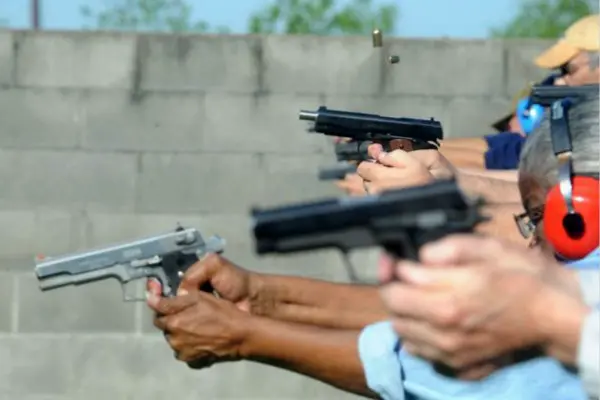War or chaos must never be allowed on the Korean Peninsula, Chinese President Xi Jinping told his South Korean counterpart Moon Jae-in on Thursday, calling for a resolution of the Korean Peninsula nuclear issue through dialogue and consultation.
During their talks after a welcome ceremony for Moon at the Great Hall of the People in Beijing, Xi reiterated China's opposition to the deployment of the Terminal High Altitude Area Defense system (THAAD) in South Korea, urging Seoul to continue to make efforts to properly handle the issue.
Moon, who is on a state visit to China from Wednesday to Saturday, said South Korea is willing to boost political trust and people-to-people friendship with China and strengthen the two countries' communication and coordination in international and regional affairs.
Chinese President Xi Jinping (L) holds a welcome ceremony for South Korean President Moon Jae-in at the Great Hall of the People in Beijing, December 14, 2017. /Xinhua Photo
Mutual interests in maintaining peace
Tensions on the Korean Peninsula escalated this year as the Democratic People's Republic of Korea (DPRK) upgraded its missile and nuclear weapons program, while the United States and South Korea conducted several large-scale military drills in the region.
DPRK leader Kim Jong Un and US President Donald Trump frequently exchanged verbal threats and insults, with Trump repeatedly saying that military options are on the table.
On November 29, Pyongyang said it successfully test-fired a newly developed Intercontinental Ballistic Missile (ICBM) "capable of striking the whole mainland of the US."
United Nations chief Antonio Guterres warned the world against "sleepwalking into war" over the DPRK earlier on Thursday.
In his meeting with Moon, Xi stressed China's commitment to the goal of denuclearization on the peninsula and said war or chaos would not be tolerated.
"The peninsula issue must in the end be resolved via dialogue and consultation," he said, noting that China and South Korea share "important common interests" in maintaining peace and stability on the peninsula.
China will continue to support Seoul and Pyongyang to improve ties through dialogue and contact, he told Moon.
The South Korean president said Seoul is committed to resolving the nuclear issue on the peninsula through peaceful means, adding that it is willing to make joint efforts with Beijing to maintain peace and stability in the region.
DPRK leader Kim Jong Un (C) gives field guidance to various units in Samjiyon County, in this photo released by DPRK's Korean Central News Agency (KCNA) in Pyongyang, December 9, 2017. /Reuters Photo
Agreement and disagreement
As China and South Korea mark the 25th anniversary of the establishment of their diplomatic ties this year, the two countries are in a complex relationship: both countries agree on the need for more practical cooperation in various fields, but they disagree on the deployment of the US THAAD anti-missile system in South Korea.
On Thursday, the two sides signed seven memoranda of understanding to expand cooperation in the areas of health, industry and information technology, agriculture, commerce, energy, the Winter Olympics and education.
South Korea would like to play an active role in the China-proposed Belt and Road Initiative and work with China and other countries to "build a community of a shared future for mankind," Moon said, echoing the two major concepts raised by Xi.
South Korean President Moon Jae-in (C) and his wife (R) have Chinese breakfast in Beijing, December 14, 2017. /VCG Photo
On the other hand, the Chinese president reiterated China's position on THAAD and said he hoped South Korea would continue to "appropriately handle" the issue.
Beijing has repeatedly voiced its strong opposition to THAAD deployment in South Korea, worrying that it may harm China's security interests. The bilateral relations experienced serious setbacks due to the dispute.
On October 31, Beijing and Seoul reached an agreement to bring cooperation back to normal as soon as possible. According to a Chinese Foreign Ministry statement, South Korea has acknowledged China's stance and concerns on the THAAD deployment, and made it clear that the installation of THAAD will neither target any third country nor harm China's strategic security and interests.
The South Korean Foreign Ministry noted that Seoul was not considering any additional THAAD deployment, and the country would not participate in the US-led missile defense networks. It also stressed that trilateral security cooperation between Seoul, Washington and Tokyo would not extend to a military alliance.
In an exclusive interview with China Central Television (CCTV) ahead of his visit to China, Moon said THAAD will only be used to defend his country against the increasing threats from the DPRK. He also suggested that South Korea and China should have a better understanding of the issue by "standing in the shoes of the other side."
"China was not involved in the process of establishing THAAD," Emanuel Yi Pastreich, director of the Asia Institute in Seoul, told CGTN, explaining that Beijing was not properly consulted on the issue.
"I think we really have to start with that serious dialogue in bringing all the players to the table for a concrete approach based on the scientific method, not on emotions," he said.
(CGTN)
 简体中文
简体中文

